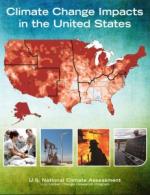
NCSE was on hand for the release of the third National Climate Assessment. Produced by a team of more than 300 experts, the NCA summarizes the impacts of climate change on the United States, now and in the future. When it was unveiled at the White House on May 6, 2014, NCSE's Mark McCaffrey was there to discuss the educational uses of the NCA at a panel streamed live and currently available from C-SPAN; his presentation begins at around the 1:38 mark. On the same day, McCaffrey discussed the educational uses of the NCA in a conference call with the NCAnet Education Affiliate Group, and NCSE's Minda Berbeco did the same in a webinar/teleconference with the Climate Literacy and Energy Awareness Network.
In a post on NCSE's blog The Science League of America, McCaffrey explained that the report provides "[b]oatloads of opportunities to drill down into the data to learn more about how climate change is impacting our country. ... Want to know how climate change is impacting your region? They have that. How climate change will affect coastal and marine systems? That's included. Did they include tribal nations? Of course. How human health, agriculture and water resources will change? That, too. Energy supply and use? Yep. Biodiversity? Sure. All this and much, much more. A veritable treasure trove of information." He summarized, "The NCA is the first step to changing the conversation in America about climate change, and educators have a unique opportunity to jump in and use this new material to bring the challenges of climate change home to their students."
NCSE's Minda Berbeco told NBC News (May 5, 2014) that the NCA offers teachers a way to incorporate local information in their lessons on climate science, adding, "I think it's a huge opportunity for education ... not just for adults and voting-age citizens, but for everyone who's going to have to deal with climate change in the future. Which means kids." In a subsequent story, Berbeco told NBC News (May 6, 2014) that it is crucial for the children who will face the challenges of climate change in the future to be educated about it today. "It's not only a multigenerational problem — it's a huge opportunity," she said. "For each of the challenges pointed out in the report, there's an opportunity to work with mitigation and adaptation."
